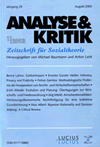Suchergebnisse
"David Copp"
Titel: Comment on Lorenzo Sacconi, Marco Faillo and Stefania Ottone: Contractarian Compliance, Welfarist Justice, and Conformist Utility
Autor: David Copp
Seite: 311-323
Abstract: This comment addresses two issues that arise in Sacconi/Faillo/Ottone's essay. The first is the problem of compliance as it arises in social contract theory. The second is the problem of avoiding an incoherence that arises in the formulation of welfarist principles of distributive justice if these principles are taken to be concerned with the distribution of welfare without restriction. Sacconi, Faillo, and Ottone define an interesting class of principles that govern only the distribution of 'material utility', which they distinguish from 'conformist utility'. Sacconi, Faillo, and Ottone are primarily concerned, however, to argue that there is a need to revise 'the utility maximization model of a rational economic man'. I discuss this claim briefly, in concluding the paper.
Titel: Morality and Society - The True and the Nasty. Reply to Anton Leist: "For Society - Against Morality?" (ANALYSE & KRITIK 19, 213-228)
Autor: David Copp
Seite: 123-140
Abstract: This paper is a reply to Anton Leist's criticisms of the view I develop in my book "Morality, Normativity, and Society". Leist claims that my "standard-based" account of the truth conditions of moral propositions is incoherent. I argue that he is mistaken about this. Leist claims that my "society-centered" account of the justification of moral standards has "nasty" implications. In the course of answering this worry, I develop the idea of a "moral necessity". My theory implies that although moral propositions are metaphysically contingent, they are most likely morally necessary. I also explain that, despite its relativism, the society-centered view is quite compatible with the idea that there are certain "moral universals". Finally, Leist claims that the arguments I have given in favor of my view are unsuccessful. But it is a mistake to think that decisive arguments can be expected in this area. The most we can expect is a clear statement of the costs and benefits of a theory. I claim that my account of the nature and grounding of morality has important advantages over familiar alternatives.
Titel: Does Moral Theory Need the Concept of Society?
Autor: David Copp
Seite: 189-212
Abstract: We have the intuition that the function of morality is to make society possible. That is, the function of morality is to make possible the kind of cooperation and coordination among people that is necessary for societies to exist and to cope with their problems. This intuition is reflected in the 'society centered' moral theory I defended in my book "Morality, Normativity, and Society". The theory is a relativistic version of moral naturalism and moral realism. This paper briefly explains some of the basic ideas of my theory and attempts to answer some of the most common objections. I argue that, despite its relativism, my views allow that certain things are simply wrong to do, without any qualifications, and it allows that members of other societies, non-human animals, and even features of the environment, might have non-derivative moral status.
Titel: For Society - Against Morality? On David Copp's Attempt to Put Society at the Centre of Ethics
Autor: Anton Leist
Seite: 213-228
Abstract: Morality and society in moral philosophy are rarely brought into direct contact, at least not at a fundamental level of justification. David Copp develops an account of practical and moral rationality that could constitute a radical change. According to Copp moral theory has to be 'society-centered' rather than focussing on the individual. This article is devoted to the moral content and structural features of a socially centered moral theory, and along those lines to its critical assessment. Concluding, it will seek to present an argument why moral philosophy ought not place society at the centre of its view.

Work and Cooperation
2011 (33) Heft 1
Editorial
Both in social theories with the aim of looking into the creative core of society as well as in everyday politics, two intuitions often supplement each other. The first intuition, empirico-analytical, views common organization of work and production as being the very aim of society, and other parts of society being explicable from this. A second intuition, ethical or moral, holds the sphere of work to be the central site for diagnoses of a society's inherent justice. Both intuitions not only con...